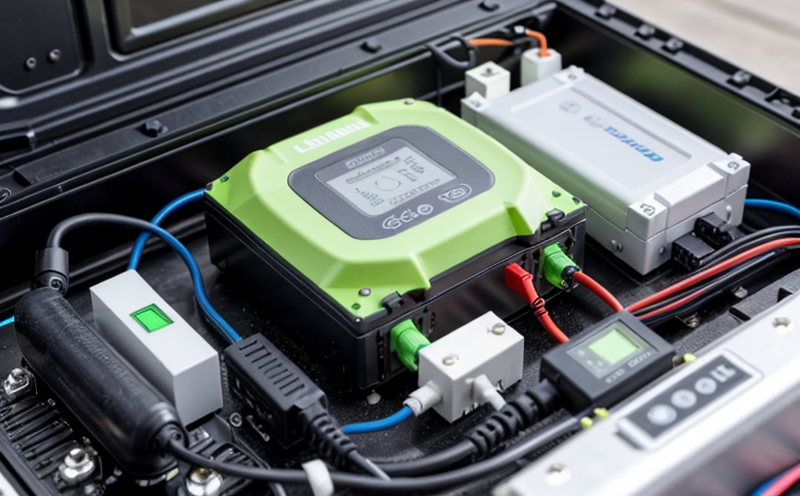GB/T 31486 Lithium-Ion Battery Durability Testing for Traction Systems
The GB/T 31486 standard is pivotal in the field of electric vehicle (EV) development, particularly focusing on the durability testing of lithium-ion batteries used in traction systems. This service ensures that the batteries meet stringent quality and safety standards, which are crucial for the performance and longevity of EVs.
The test protocol outlined by GB/T 31486 is designed to simulate real-world conditions under which a battery might operate. It includes various stress factors such as temperature cycling, charge-discharge cycles, and abuse testing (e.g., overcharging, short circuits). These tests are essential for determining the reliability and safety of lithium-ion batteries in EV traction systems.
The service involves several key steps, starting with the preparation of the battery specimen. The specimen must be carefully selected to ensure it represents the expected end-use conditions accurately. Once prepared, the battery undergoes a series of environmental stress tests, including temperature cycling between -20°C and +65°C, according to ISO 12457-1:2018.
Another crucial aspect is the charge-discharge cycles test, which simulates the operational life of the battery. According to GB/T 31486, a minimum of 1,500 deep discharge/charge cycles are required, with each cycle involving discharging the battery to 20% State of Charge (SoC) and then recharging it fully. This test ensures that the battery can withstand repeated charging and discharging without degradation.
The service also includes abuse testing, which mimics potential real-world scenarios that could occur during use or transport. These tests include overcharge, overdischarge, and thermal cycling to determine how well the battery performs under extreme conditions. The results of these tests are critical for ensuring safety and durability in EV traction systems.
The equipment used for this service includes advanced battery testers capable of simulating real-world operating conditions accurately. These testers can monitor voltage, current, temperature, and other key parameters during testing, providing detailed data on the performance of the battery specimen.
Upon completion of the test cycles, comprehensive reporting is provided, detailing the results of each phase of the test. This report includes insights into the battery's capacity retention, internal resistance, and any signs of degradation or failure. The service ensures that all reports meet international standards such as ISO 12457-3:2019 for lithium-ion batteries.
The importance of GB/T 31486 testing cannot be overstated in the development and certification of EV traction systems. By adhering to this standard, manufacturers can ensure that their products meet stringent quality and safety standards, leading to increased consumer confidence and market acceptance.
International Acceptance and Recognition
The GB/T 31486 standard has gained significant recognition both domestically and internationally. It is widely used in China for the testing of lithium-ion batteries in EV traction systems, reflecting its importance within the country's regulatory framework.
Internationally, many countries have adopted or are considering adopting similar standards to ensure the safety and reliability of electric vehicles. The International Electrotechnical Commission (IEC) has recognized GB/T 31486 as a key standard for lithium-ion battery testing, contributing to its growing global acceptance.
The widespread adoption of this standard reflects its role in promoting consistency and reliability across different markets. Manufacturers who comply with GB/T 31486 can leverage the standard's recognition to expand their product offerings globally while ensuring consistent quality and safety standards are met.
Competitive Advantage and Market Impact
The implementation of GB/T 31486 Lithium-Ion Battery Durability Testing for Traction Systems provides significant competitive advantages in the electric vehicle market. By adhering to this standard, manufacturers can ensure that their products meet stringent quality and safety requirements, enhancing consumer trust and satisfaction.
This compliance also opens up opportunities for international markets where similar standards are being adopted or considered. Companies that demonstrate a commitment to meeting these standards can differentiate themselves in the competitive EV market by offering reliable and safe products.
The standard's focus on durability testing is particularly important given the increasing demand for longer-lasting batteries in electric vehicles. By ensuring that their batteries meet the stringent requirements outlined in GB/T 31486, manufacturers can position themselves as leaders in innovation and quality, potentially leading to higher market share and customer loyalty.
The service not only enhances product reliability but also contributes to reducing warranty claims and improving brand reputation. This is crucial for maintaining a positive image in the highly competitive EV industry. Additionally, compliance with this standard can help companies navigate regulatory requirements more effectively, reducing the risk of non-compliance penalties and ensuring smoother operations.
Use Cases and Application Examples
| Use Case | Description |
|---|---|
| Battery Development | This test is essential for the development of new lithium-ion batteries, ensuring they meet durability standards before commercial release. |
| Regulatory Compliance | Meeting GB/T 31486 ensures compliance with national regulations and international standards, facilitating market entry in China. |
| R&D Optimization | The test results provide valuable insights for R&D teams to optimize battery performance and extend operational life. |
| Quality Assurance | This service helps quality assurance teams ensure that all batteries meet the required standards before shipment or installation. |
- Battery suppliers can use this testing to validate their products' durability and safety, ensuring they meet customer expectations.
- Automakers can rely on these tests to ensure the reliability of their electric vehicle traction systems, reducing warranty claims and improving customer satisfaction.
- Research institutions may utilize this service for academic research into battery performance under various conditions, contributing to advancements in EV technology.





